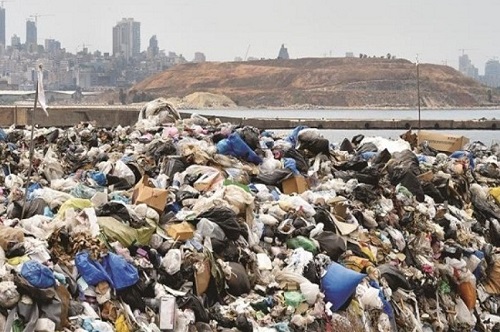NN photo
By
Rooja Mohassessy
“This used to be the sea. One day we looked out, we couldn’t see the sea”
The mountain began disappearing in truckloads.
It was erected during the civil war:
axiomatic proof that wars do not cause dearth,
but excess, not exactly abundance, but sufficient dirt
to add a mountain to the earth.
And we called it Borj Hammoud Mountain—
A soft yawn of sentient slumber that knew
our city’s intimate rhythms, our rapacious appetite and
our daily cleansing rituals—the shedding of leftover errors
and facts as unbecoming as half-formed contaminated
children and mangled steel.
It crawled with long snakes and our meek
beliefs in the Samaritan gestures which all in
good time, were to pile up and absolve
the city of dross. And refrigerators,
so many refrigerators that could no
longer preserve our dewy dreams but refused
to thaw into the thin air of our expectations.
And we carried on at the seaside, encased in
our whitewashed Mediterranean walls adorned
with azure tiles, fortified illusions that couldn’t keep
the strident stench out. It rammed itself into rooms,
It had no need to ooze beneath doors into basements,
it appeared through sheer will. While we waited patiently
for a change in the direction of toxic wind, we taught
the children how to inhale death in small sips.
Borj Hammoud Mountain—our communal black hole of nondescript
inequity, topped with dirt, a cat half covering her dump—innocent enough.
Then the mountain began disappearing.
A procession of trucks glowing with heavy metal,
radioactive green, and microplastic, teeming with sluggish
bacteria and dripping thin juice, passed our doors, accompanied
daily by a faithful flock of seagulls, until the mountain was expunged
(though the rats remained like loyal pets) and we had reclaimed our natural land.
Then on one numbered day, our fishermen returned with mad talk
of scaled creatures floating on the sea like slaughter,
of fetid screams that bubbled in pain and refused to lie down on their sides.
And one unconscionable morning, we gazed out the window
to find we had shoved the sea out of our way.
(Title quoted by Arpi Kruzian in “No End to Crisis in Sight as Lebanon’s Garbage Mountains Grow” by Ellen Francis. Reuters, February 4, 2018)
Outside
She tucked the Downy-scented shirt
into his pants, rolled up the long cuffs—
You’ll grow into it.
She tied his boot laces, his pink fingers
not yet deft enough for the bunny bow—
two loops…cross the bunny ears…pass one
through…now pull
The trigger set at rabid hyperburst defers the
recoil impulse and significantly augments
the hit probability in cases requiring
a wide-scale quick kill.
He slept best on his tummy.
On his back, he glowed
in the dark like baby Jesus, always sentient,
pulling at the folds of his belly fat, blessing
mother as she stopped by every night
and hung over the crib, his breath rising
and falling on her ears like praise.
The weapon is also equipped with the red
light-emitting diode which supplies the aimpoint.
An illuminated dot on rapidly shifting blood
guarantees accuracy irrespective of eye position or skill.
At three he would not wean.
Respect his need, read the section in
the booklet on child-led gentle weaning,
and so they played hide and seek
with mama’s breast—dressed up
as magician, he’d conjure out
her softness from behind
the silk veil of her blouse.
The projectile ejects with muzzle
velocity more virile than sound.
The feral ripping of some membranes
and the permanent crushed cavity created
as the soft tissue is forced away into
a massive keyhole wound
may be recorded as collateral
damage or death fulfilled.
Once outside catches up with him, it will offer
him grownup toys. He will step into the
oversized world, eager to pick a team
and play a game. He will try so quick
to grow and fill it, just like he had inside
mama’s belly.
He will take every rot
out of Pandora’s box into his mouth
and suck for the honey of her breast.
Outside will feed him fillers in
her name, replace her sweetness
on his tongue with the grease of god,
and rich dreams. Stuffed with freedom,
he will toddle on his own, eyes gaping-open
to the slaughter. His smile will shine so bright
even then— a man never forgets how to love.
Rooja Mohassessy
Rooja Mohassessy is an Iranian-American living in Northern California. She is currently taking a break from her job as a high school English and drama teacher to pursue an MFA in poetry.



No Comments Yet!
You can be first to comment this post!